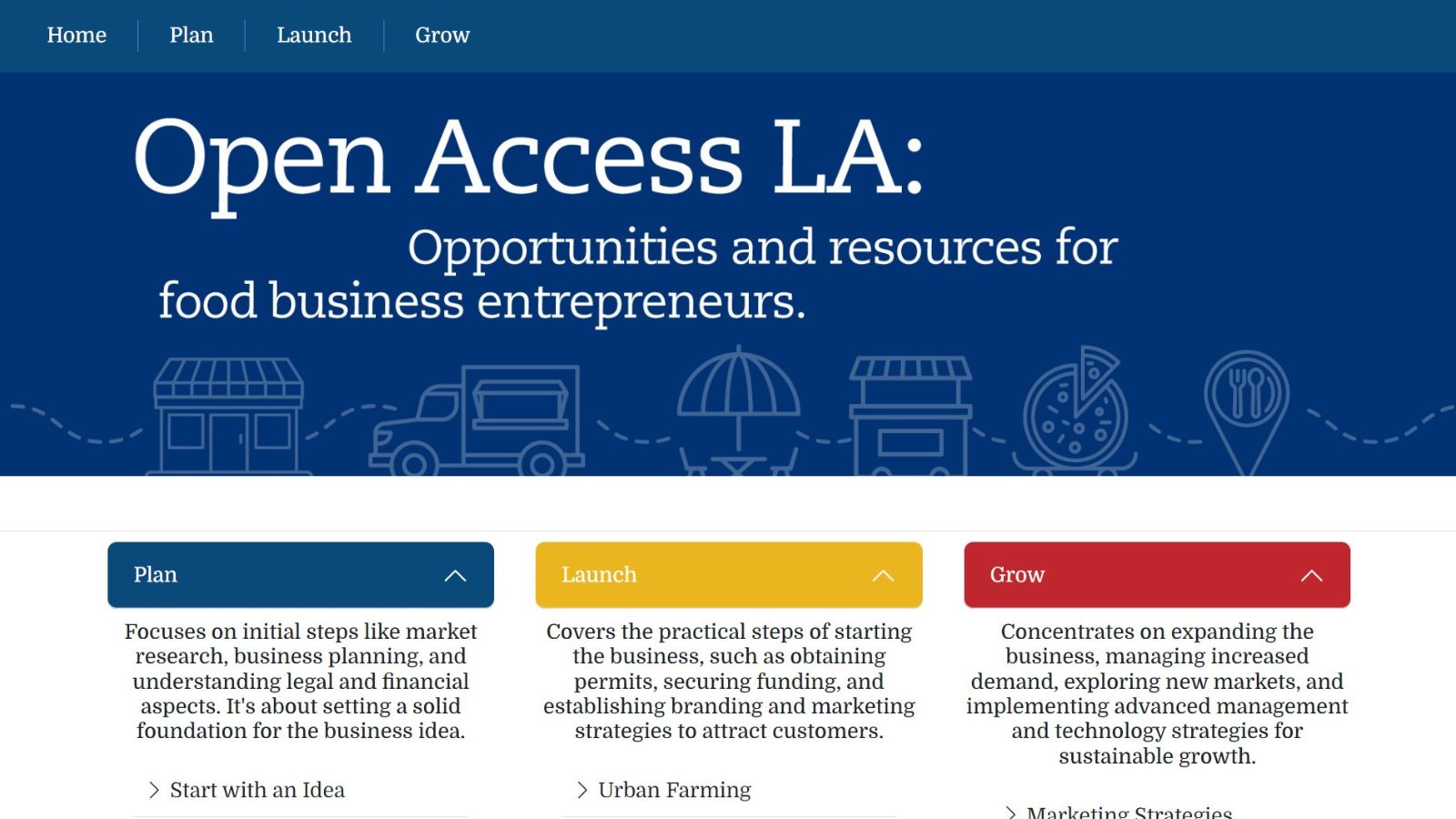A free, one-stop-shop resource, tailored specifically for the Los Angeles market, offers tools for creating business plans, guidance on funding, help obtaining permits and licenses, and more.
Contact: Eric Baker
Media Relations Manager
The Aspen Institute
[email protected]
Washington, DC, June 18, 2024 – Research has shown that since the COVID-19 pandemic, about a third of Los Angeles County residents were food insecure, struggling to access enough food. 30% of residents were food insecure in 2023. One challenge these residents’ face is a lack of food outlets that provide healthy, affordable, and good quality food, particularly in low-income neighborhoods.
The Institute for Food System Equity at the USC Dornsife College of Letters, Arts and Sciences aims to improve L.A.’s food landscape with today’s launch of Open Access LA, a free, open-source web portal for budding food entrepreneurs.
Developed by public health leaders, policymakers and researchers from Food & Society at the Aspen Institute, who partnered with USC Dornsife’s institute and the Los Angeles Food Policy Council (LAFPC), Open Access LA addresses the unique challenges entrepreneurs face when starting a food business in the county, offering them resources and tools to set up shop in their communities.
Open Access’s goal to expand food enterprises and empower entrepreneurs from diverse backgrounds and communities aligns with the USC Dornsife institute’s mission to bring healthier choices to L.A.’s food system and make the food system more equitable overall.
“Los Angeles is one of the great food capitals of the world, despite its high rate of people lacking access to healthy, affordable food. The Open Access platform will support new culinary talents of all sorts — from restaurateurs and food trucks to urban farmers and grocers — to take root here,” said Kayla de la Haye, founding director of the Institute for Food System Equity at USC Dornsife’s Center for Economic and Social Research. “For the institute, it’s another way for us to connect with and support local food retailers, who are key to helping solve pressing food problems in L.A.”
A Custom Fit
Many food entrepreneurs, particularly those of color, face significant hurdles when attempting to open a business. Obtaining financing, navigating regulations and securing permits and licenses pose serious challenges.
Key features of the Open Access LA portal include:
- Business planning resources, including guides for writing a business plan, securing funding and choosing a business structure.
- A start-up guide specific to food businesses that includes a checklist for permits, licenses and certifications required for food trucks, restaurants, catering and private labels.
- Marketing tips, connections to restaurant associations and chambers of commerce, and other professional services tailored for the food industry.
“Starting any new business is challenging, but the rules and processes for opening a food business can be daunting. The Open Access portal demystifies that journey on one easy-to-use platform,” said Alba Velasquez, executive director of LAFPC.
Investing in Communities
Creating sustainable and equitable communities starts with ensuring that L.A.’s food retail businesses are run by local residents, de la Haye explained. This gives more control over the city’s food supply and offerings, rather than relying on outside companies. Profits stay in the community and opportunities expand for those historically disenfranchised or excluded from these types of businesses.
Many Latino and Black entrepreneurs, however, struggle to access credit, which is essential for starting any business. They often lack connections with banks or credit unions, increasing their financial risk and hampering their ability to secure loans for business growth, according to Food & Society researchers.
“We want to help remove some of the many barriers Latino, Black, Indigenous and woman-owned small businesses face in getting access to capital, technical assistance and guidance,” said Corby Kummer, executive director of Food & Society.
So, experts at the program set out to develop a solution, and in May 2022, they released the first Open Access in Washington, D.C.
USC Dornsife’s de la Haye explained that she sees Open Access as another pathway to reduce the number of people struggling to find healthy food in their neighborhoods. “Supporting local food businesses run by community residents not only allows locals to help feed their neighbors food that is culturally relevant but also creates an opportunity for business owners to reinvest money back into the community. This approach will help ensure that the food systems in Los Angeles are resilient.”
L.A. is the fourth city to roll out the Open Access portal, following Washington, Baltimore and Philadelphia.
Next Steps
De la Haye views Open Access LA as a launchpad to strengthen USC Dornsife’s ties with Los Angeles food businesses and other stakeholders who can use the institute’s data-driven resources to develop a more equitable food system.
“We have the expertise to provide data that identifies which communities need more access to healthy and affordable food,” she says. “This can help us target where food entrepreneurs can be most impactful.”
###
Food & Society at the Aspen Institute brings together leaders and decision-makers in the food and beverage industry and the public health community—scientists, nutritionists, environmentalists, entrepreneurs, chefs, restaurateurs, farmers, and food makers of all kinds—to find solutions to production, health, and communications challenges in the food system. The goal is for people of all income levels to eat better and more healthful diets—and to enjoy them bite by bite. For more information, please visit AspenFood.org or follow us on Twitter, LinkedIn, Instagram, and Facebook.
The USC Institute for Food System Equity conducts research to generate actionable insights to help build food systems that support human health, planetary health, and equity. They specialize in team science that engages multiple disciplines, and community, public, and private partners to tackle complex food system problems.

